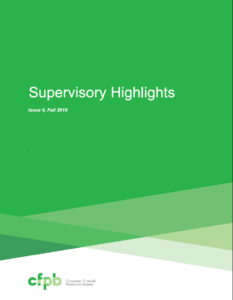 The Consumer Financial Protection Bureau’s latest edition of Supervisory Highlights was released last week. I expected some stinging comments directed at debt collectors and debt buyers, given the recent consent decrees. What I found was the opposite.
The Consumer Financial Protection Bureau’s latest edition of Supervisory Highlights was released last week. I expected some stinging comments directed at debt collectors and debt buyers, given the recent consent decrees. What I found was the opposite.
The 45-page report devoted only three paragraphs to supervised ARM entities. And, what was reported only indicates the potential for regulatory violation and did not note any instance where a consumer was actually harmed.
Communications with Consumers
Here the Bureau looked at supervised entities’ compliance with section 1692c of the Fair Debt Collection Practices Act. The CFPB’s beef here was that ARM companies had inadequate systems in place to prevent telephone calls to consumers 1) when the debt collector knows the consumer is represented by an attorney; and 2) at the consumer’s place of employment if the debt collector “knows or has reason to know that the consumer’s employer prohibits the consumer from receiving such communication.”
It is not so easy for a debt collector to know a consumer is represented by an attorney when the consumer identifies an attorney, but the consumer’s so-called attorney never responds to the debt collector’s inquiries. There’s a lot of gaming going on here and debt collectors have been struggling with unresponsive consumer attorneys for years. I have addressed these claims in lawsuits and they are often a low-level miscommunication or a failure of the consumer’s attorney to respond to a debt collector’s numerous requests for communication.
On the second point, whether it is permissible to make contact at a place of employment is more difficult to pin down. The FDCPA only requires the debt collector to “know or [have] reason to know” that the employer prohibits the call to the consumer.
Failure to State a Call is From a Debt Collector
The Bureau noted that in some telephone calls made by supervised entities following the initial communication, debt collectors “did not always state . . . that the calls were from debt collectors.” FDCPA § 1692e(11) does not require magic words, so calls where a collector states “this is an attempt to collect a debt” will pass muster under scrutiny from some courts. Other language can satisfy § 1692e(11) as well. It is also likely that the collectors had policies in place that required the disclosures to be made. Score another compliance achievement for ARM firms.
Reasonable Written Policies and Procedures Under Regulation V
This is the ninth Supervisory Highlights the Bureau has issued and like several earlier reports it continues to find inadequate policies and procedures under the Fair Credit Reporting Act Furnisher Rule (12 C.F.R. § 1022.40, et seq.) also known as Regulation V.
The Bureau has provided guidance on its expectations for Regulation V compliance in consent decrees. The Bureau is not very clear in detailing the nature of the non-compliance, except for one item: the Bureau’s position is that a furnisher should not, in response to a consumer dispute, simply delete tradelines without “conducting an investigation.”
Despite the criticism, no actual harm to consumers was reported.


